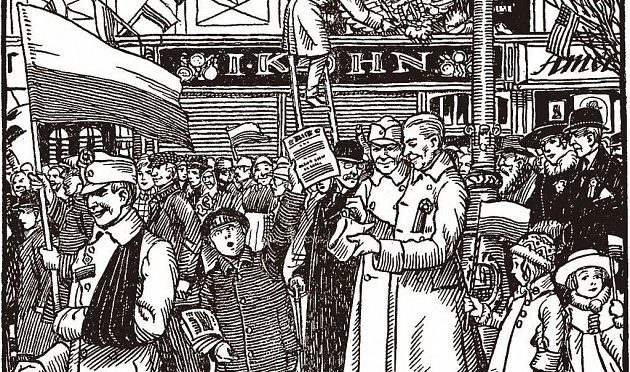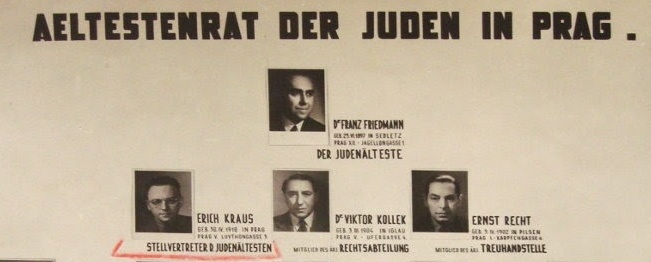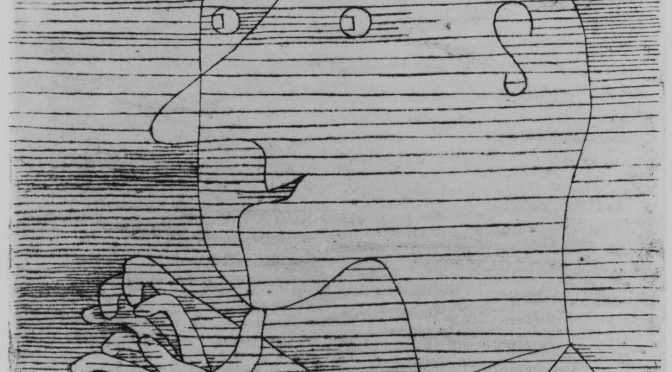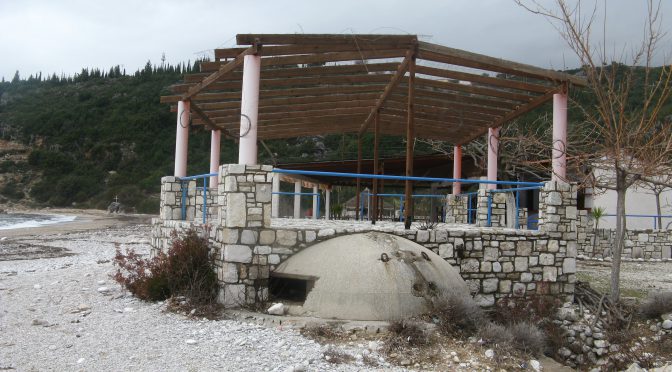
A lecture by Ségolène PLYER (University of Strasbourg)
Venue: CEFRES, Na Florenci 3, Prague 1 (Conference Room, Entrance C, 3rd Floor)
Horaires: 17:00-18:30
Organizer: CEFRES
Language: English
At the end of 1918, the change of political regime in Bohemia was rather pacific. Still, the archives show how much contemporaries feared the fall of the Habsburg monarchy. They also keep track of the expectations raised by the new Republic. Through the overlap of claims, wavering and conflicts, the foothills at the Silesian border, with its German and Czech settlement, exemplify the renegotiation on a local scale of the new social order.
llustration: Lithography reproduced by: https://nachodsky.denik.cz/kultura_region/pamatne-rijnove-dny-roku–v-hradci-kralove20081028.html

A lecture by Karolina Szymaniak (Wrocław University) in the frame of the seminar on Modern Jewish History of the Institute of Contemporary History (AV ČR) and CEFRES in partnership with the Masaryk Institute (AV ČR).
Where: CEFRES library, Na Florenci 3, 110 00 Prague 1
When: from 5 pm to 6:30 pm
Language: English
Abstract
When in 1988 poet Marcin Świetlicki formulated in the now famous poem his sharp criticism of the rhetorics of cultural opposition and its possession by history, he wrote: „Instead of saying: I have a toothache, I’m/ hungry, I’m lonely (…)/ they say quietly: Wanda/ Wasilewska, Cyprian Kamil Norwid,/ Józef Piłsudski, the Ukraine, Lithuania/ Thomas Mann, the Bible, and at the end a little something/ in Yiddish” (trans. W. Martin). As Eugenia Prokop-Janiec has shown, in the 1980s Yiddish came to be treated as a part of the code of independent culture, and investment with it became a form of resistance. But what was this undefined „little something” and what tradition was underlying its presence in the Polish discourse? What meaning and content was it endowed with? How does this tradition bear on contemporary representations of the Jewish Polish past and the way we write the history of culture in Poland?
The talk is a discussion of existing and possible approaches to the study of Yiddish Polish cultural contacts in the 20th century, their limits, and ramifications. It is a working presentation of an on-going project. By turning to the history of Yiddish Polish cultural relations and their discourse, and interpreting them through a different lens of cultural studies, the study also seeks to think other ways of conceptualizing history of culture in Poland. An approach that includes the minority perspectives and respects their independence, and create a space where the „little something” turns into a complex polyphonic phenomenon in its own rights.

A lecture by Jan Láníček (University of New South Wales, Sydney) in the frame of the seminar on Modern Jewish History of the Institute of Contemporary History (AV ČR) and CEFRES in partnership with the Masaryk Institute (AV ČR).
Where: CEFRES library, Na Florenci 3, 110 00 Prague 1
When: April 10, 2018, 17:00
Language: English
Abstract
Shortly after the end of the war, European societies attempted to come to terms with the legacies of the genocides committed by Nazi Germany with the help of local collaborators. Judicial retribution played a key role in this societal reconciliation. Among those accused of previous collaboration was also a relatively small group of those considered Jewish or Roma by the Nazi regime. Former members of the Jewish self-administration and the so-called privileged camp prisoners faced a long list of allegations coming from their communities as well as the state prosecutors. The lecture will analyse selected retribution trials and show how the reconstituted minority societies coped with the cases of alleged collaborators among their midst

Fourth session of the 2018 common epistemological seminar of CEFRES and IMS FSV UK led by
Ania Gnot (University of Opole / Institute of Czech Literature AV ČR / CEFRES)
Point of View: Autofiction As a Genre
Where: CEFRES library – Na Florenci 3, 110 00 Prague 1
When: Thursday 05.04.2018 from 3:30 pm to 5 pm
Language: English
Text:
- Małgorzata Czermińska, “‘Point of View’ as an Anthropological and Narrative Category in Nonfiction Prose”, Teksty Drugie, 2012-2, p. 140-155.

A lecture by Lisa Peschel (University of York) in the frame of the seminar on Modern Jewish History of the Institute of Contemporary History (AV ČR) and CEFRES in partnership with the Masaryk Institute (AV ČR).
Where: CEFRES library, Na Florenci 3, 110 00 Prague 1
When: March 27, 2018
Language: English
Abstract
 During the 40-month project Performing the Jewish Archive, we experimented with type of performance, which we called co-textual performance, to try to generate more intense audience engagement. That is, when we attempt to re-stage scripts written by Jewish authors during World War II, the historical context is one of the most important aspects of the plays. We argued that present-day spectators would be more engaged if they knew the historical background, but how to best present it? We proposed that performed scenes regarding the history, which would be presented as ‘co-texts’ – that is, incorporated into, and just as important as, the script itself – would be more effective than more traditional pre-show talks or program notes that treat the historical information as context. In this talk I describe how we created co-textual performances and how we tested their effect on the audience.
During the 40-month project Performing the Jewish Archive, we experimented with type of performance, which we called co-textual performance, to try to generate more intense audience engagement. That is, when we attempt to re-stage scripts written by Jewish authors during World War II, the historical context is one of the most important aspects of the plays. We argued that present-day spectators would be more engaged if they knew the historical background, but how to best present it? We proposed that performed scenes regarding the history, which would be presented as ‘co-texts’ – that is, incorporated into, and just as important as, the script itself – would be more effective than more traditional pre-show talks or program notes that treat the historical information as context. In this talk I describe how we created co-textual performances and how we tested their effect on the audience.

Third session of the 2018 common epistemological seminar of CEFRES and IMS FSV UK led by
Katerina Zheltova (IMS FSV UK)
Approaching the Borderlands: Cultural Intimacy as Theory and Practice
Where: CEFRES library – Na Florenci 3, 110 00 Prague 1
When: Thursday 22.03.2018 from 3:30 pm to 5 pm
Language: English
Text:
- Michael Herzfeld, “Introducing Cultural Intimacy”, in Cultural Intimacy: Social Poetics in the Nation-State, New York and London, Routledge, 2004, pp. 1-33.







